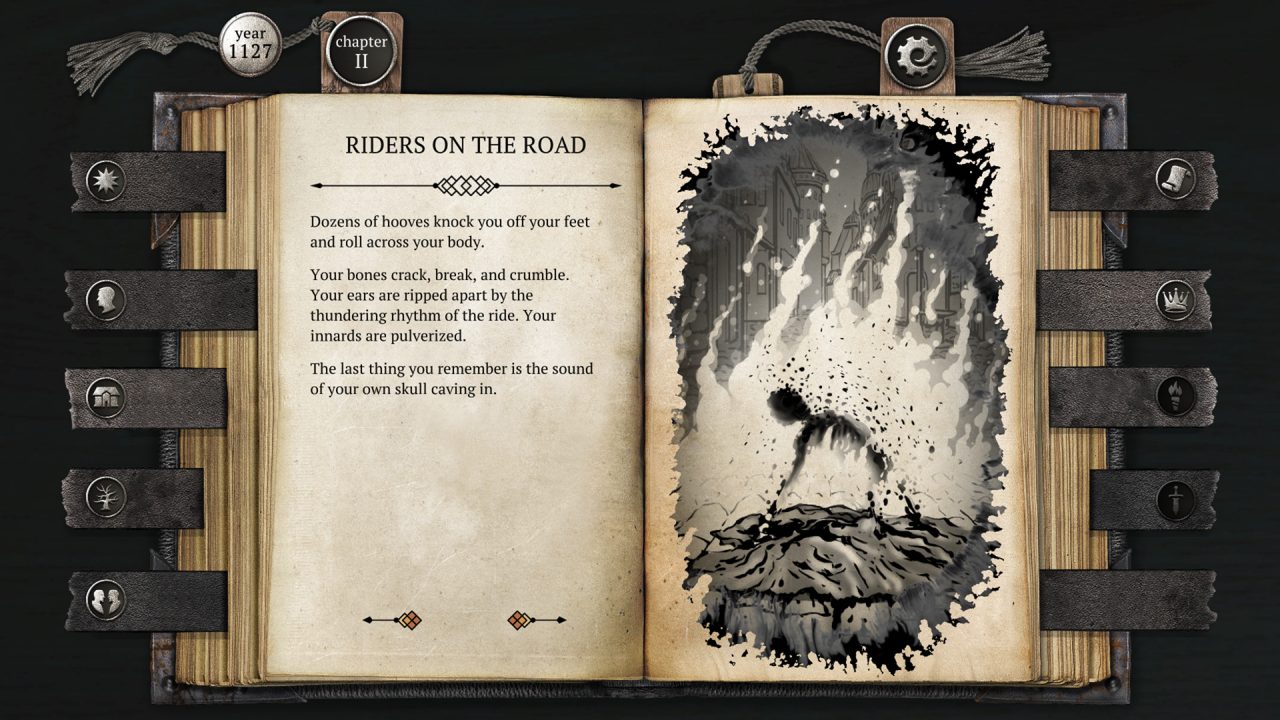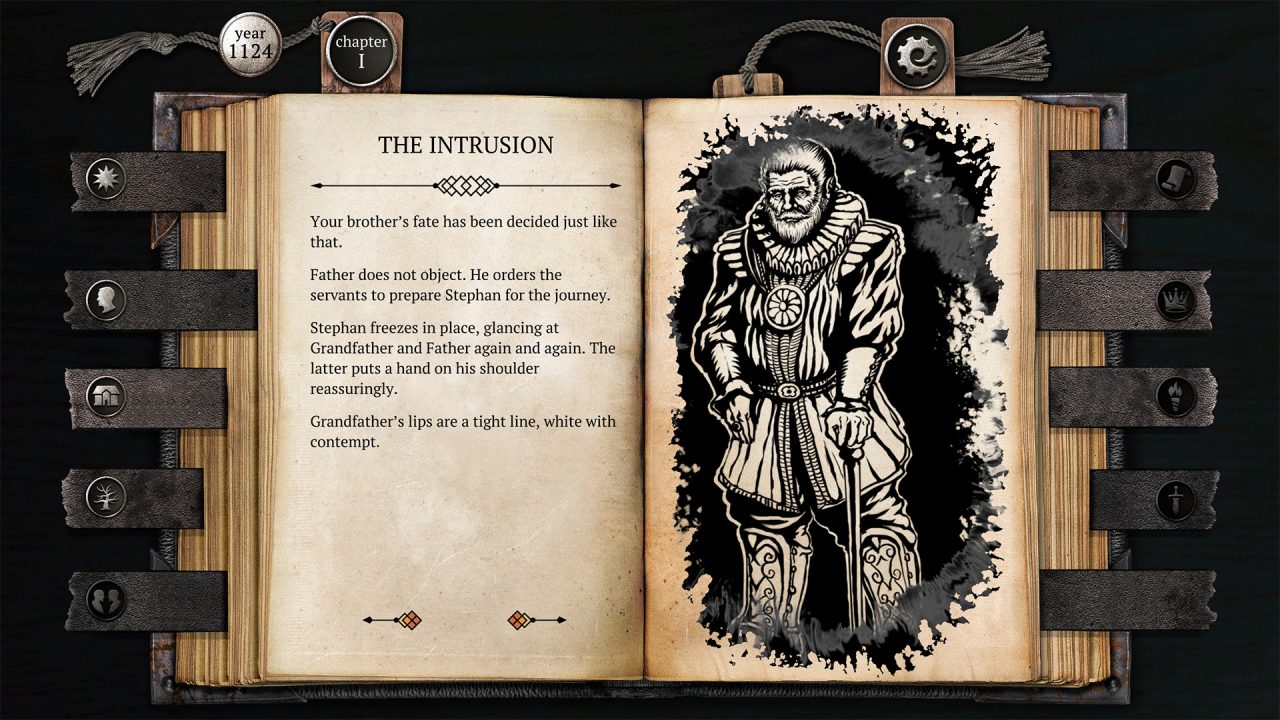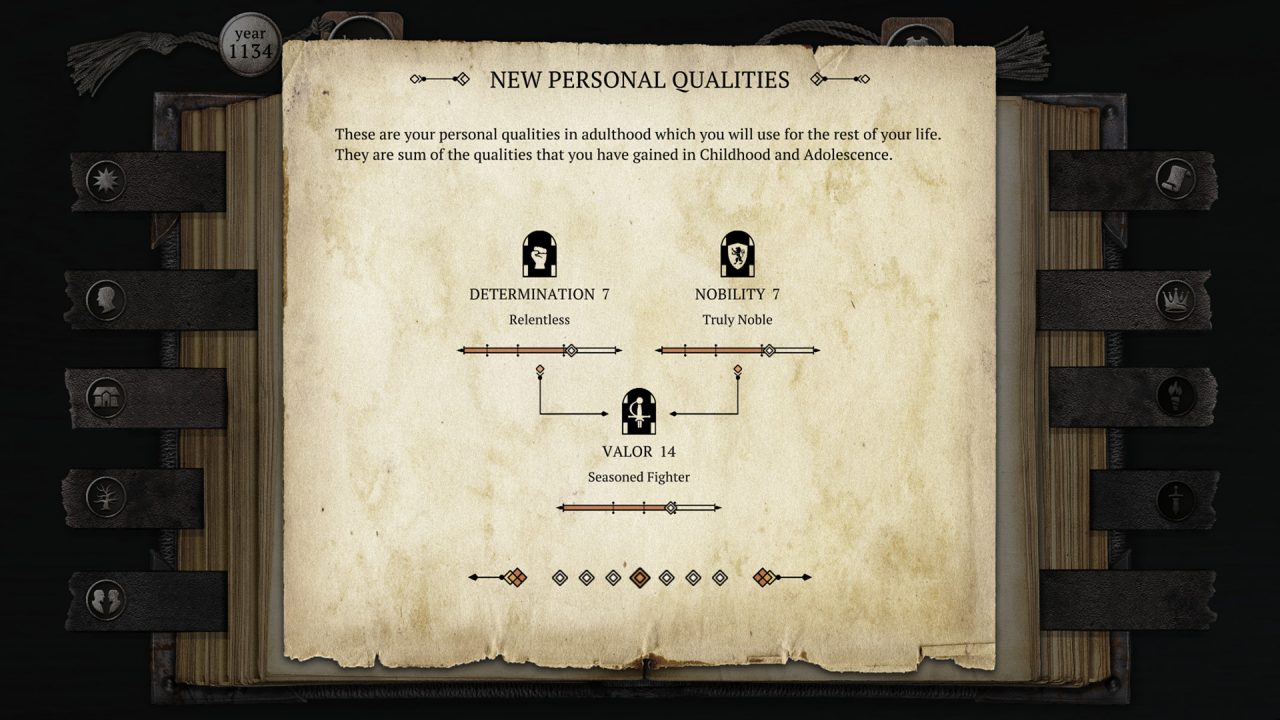Adventure game aficionados have debated what “choices matter” means since Telltale Games graced us with the devastating iteration of The Walking Dead following Lee and Clementine through the apocalypse. Is there really any choice, or are all paths fated to one place? Does it matter that a character “will remember that?” No matter your thoughts or feelings on how the story played out, the facts are that few conclusions suited the choices over the course of the game, at least in any significant fashion. The Life and Suffering of Sir Brante (TLSSB) moves the genre forward in terms of player choices mattering, but can this fifteen-hour struggle from birth to death maintain the delicate house of cards it builds?
At the outset, players come into the world answering a philosophical question: what determines one’s fate? Then, we are born. To whose hand do we reach out? Then, we are left alone in a field. How do we react? Do we cry, seek comfort, or stay put stoically? And so on. With every turn of the page, we grow and develop. Each choice builds stats, fosters or disintegrates relationships along a continuum, and may have some bearing on the outcome of the Empire we are born into.
You live every year of Sir Brante’s life, sometimes experiencing multiple events in each year. The flow of the narrative is pretty simple: a set-up involving characters interacting or a description of something happening, player makes a decision, narrative outcome and stat changes occur. Repeat, repeat, repeat. It’s actually way more engrossing than it sounds.
But what are choices without a compelling plot and world? TLSSB takes place in the Empire, a medieval-esque, feudal kingdom where people are thrown into one of three Lots by birth: commoner, noble, or priest. For those who prove themselves, a commoner can earn his way into priesthood or nobility. Yet, even within each Lot, hierarchies exist, such as between born nobility and earned nobility. And then there are the Arknians, the superior, blue-skinned race that truly reigns over all humanity.
TLSSB is not shy about describing how unjust and awful the world is. Naturally, Sir Brante starts off as a commoner, his path in your hands. Things are not so simple in the Brante household, though. A father who earned nobility married a woman born into it, had a kid, and then she died. His first son is well aware of his nobility birthright. Father remarried a commoner, and then you were born. This commoner had a child with another commoner before marrying your father, and that is your older sister. Your older, noble brother makes sure your commoner sister and the entire family is aware of her station. Also, you eventually have a brother from your two parents. Grandfather’s a horrible, tyrannical grouch, too. Have fun!

The writing is fantastic. Unlike some titles, the writing paints a beautiful picture of the world without droning on and on. Each event is sufficiently described with good detail but never overstays its welcome. For the whole fifteen hours! For this reason, the pacing makes for an addicting experience. Not only is it tight and succinct, but the characters come to life with each dynamic interaction. Everyone has a distinct voice, the world is appropriately harrowing and, as Sir Brante does, players learn how the world works as we become more exposed to it.
Another reason I couldn’t stop playing is because choices actually do matter! From friends to family relations, all the way to profession and personal achievements, TLSSB really is a choose-your-own-adventure game. Decisions I had made years ago are directly referenced by characters in the present, for better or worse. Opportunities I have for certain decisions are shaped by the personality I developed. Most decisions have three or more choices, some of which require certain stat thresholds, whether they be relationships, personal qualities, or sheer willpower. Unfortunately, this means that sometimes what appears to be a four-option choice is effectively a two-option choice at certain points of the game, which is where naysayers might point and say, “See, it’s not really a ‘choices matter’ game.” And, to be honest, I can’t fault them for that interpretation.
Regardless, for the vast majority of TLSSB, I felt as if Brante’s fate was in my hands. Brante’s choices throughout life were truly up to me. Ten hours in, I became incredibly enraptured with this terrible world. Could I improve things? Leave a real mark? But on a smaller scale, could I protect my friend? My family? How do I balance my profession with everything else going on? Oh, and I caught this person’s attention. Do I maintain decorum or remain true to myself? Will this ever come to bite me in the behind? And let’s not even mention all of the off-the-wall ridiculous events that occur throughout the game because, while the world is 95% grounded in reality, some degree of fantasy and mysticism exist just to add a bit of spice. Unfortunately, this house of cards built ten hours in was bound to fall, which absolutely ejected me from the experience.

I decided to play on Iron Man mode, meaning there was never any going back. To me, what’s the point in making these sometimes maddening decisions if I could be tempted into rolling things back? So, near the climax of the whole adventure, I ran into what I can only assume is a bug. Up until this point, the game had made clear what landmarks, stats, and world events would lead to different endings at the conclusion of each chapter. In the prime of my adulthood, I was gearing up for a satisfying path of my own design. I remained true to myself, and the game moved me on the desired path just as I had hoped. At no point had I ever made a decision or received an outcome that didn’t truly align with my intentions. I was shocked! Right at the final scene, the game presented an ending that should not have been possible. I had clearly satisfied one condition and did not satisfy another. This ending to the chapter should have been impossible based on the concrete stats and social requirement outlined, but the game claimed I had betrayed one character or didn’t meet the stat requirement for another ending. I racked my brain trying to figure out if I misunderstood something. I reviewed the requirements, read the script for the ending, looked at the outcome for the ending—and it was all just wrong. Everything I had built up to this point was meaningless, because my Sir Brante suddenly strode down a path not of my design. Rather, it was the design of some oversight in the code.
The big finale came, and I experienced the world as “my decisions” had crafted them. Decision after decision was wrong at this point because it didn’t align with the path I had built. I was horribly disappointed and mostly apathetic about the outcome. This isn’t what I wanted. It wasn’t the identity I had created. It felt unfair to build this character into this world that I had grown so attached to, only for a programming oversight to take it all away.

I realize all of this sounds pretty dramatic, but that’s how good the game was up to this point. Everything had been done immaculately. This world is incredible. I was already thinking, “This is an Editor’s Choice game for sure. Just wow.” Needless to say, the finale did not play out as I had anticipated or what I thought made sense considering all of the events that led to this point*.
My experience may be the exception or a blip in the system. I can only imagine what gratifying conclusion my Sir Brante would have met had everything played out as I had anticipated. For those looking on, sitting on the fence, I say go for it. If everything I described before the bug sounds like a game you’ve been craving, please support these developers and take the plunge. The drawings are beautiful and expressive. Although few, the sound effects complement each scene. Despite it all, I want to take another go. I had expected to jump right back in and go a starkly different path, but my soul is so beaten at this point that I can’t make myself do it. One day, for sure, but for the time being, Sir Brante will suffer at the foot of the pillar in True Death. Rest easy, my friend—this is not the goodbye you deserved.
*NOTE: The developers released a patch on April 12th after this review was written that addresses “a number of story inconsistencies” and reported errors to improve the experience.


